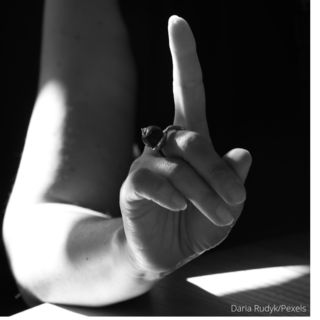The boom of interest in personality disorders has shed particular light on antisocial personality disorder (APD). Naturally, much of the information put forth regards identifying this character pathology for either relationship reasons or treatment-related purposes. Of the identifying characteristics, "lack of empathy" has taken center stage, and, as a chief feature people have latched onto, seems to have become almost synonymous with APD, similar to how "social awkwardness" can lead to conclusions of autism, or restlessness "must" mean someone has ADHD.

As written about in Tips for Accurate Diagnosing: One Symptom isn't Enough, and A Symptom is Part of a Pattern, an assumption based on one feature is bad practice and is a primary cause of misdiagnosis. While unempathic behavior is certainly a core feature of APD, behaviors/symptoms must be taken in context. Once again, it's essential to recall the words of Emil Kraepalin, the father of modern diagnostic classification, that, “A single symptom, however characteristic it may be, never justifies a diagnosis by itself…” (Spitzer et al., 2002).
The unempathic spectrum of personality pathology
As far as personality pathology is concerned, one could argue that most personalities upon reaching disorder status, on close inspection, have an unempathic component. While not as egregious as APD, even the mousy dependent personality, while it may seem counterintuitive given their tendency to yield to others, does not seem to care how their neediness enervates those close to them, so long as they're provided with what they require. That said, its more subtle nature renders it less likely to stand out, and thus less likely to be mistaken as an APD characteristic.
Before jumping to conclusions about APD because of unempathic activity, the larger clinical picture must be assessed and consideration given to the pattern that the lack of empathy is part of. A scrutinizing clinician may ask themselves, "From what place is this lack of empathy coming?" which can guide them diagnostically.
Going forward, bear in mind that an APD person's unempathic behavior comes from a place of intentional malice, either because they truly enjoy harming others, or are simply of the mind that so long as they're getting what they want it doesn't matter how it affects others.
The following personalities can also present as unempathic, and, if not carefully scrutinized, some people may mistake it, at first glance, as a sign of APD. A false diagnosis of APD can have significant stigmatizing effects, legal ramifications in the forensic arena, and deem a person incorrigible when it may not be the case. Many authorities (e.g., Yudofksy, 2005; Millon, 2011; McWilliams, 2013; Shannon, 2016) have discussed the progress that can be made in therapy with the following, which can also exhibit a lack of empathy, but are by no means antisocial.
1. Narcissistic Personality: Those familiar with the narcissistic personality know that an appalling lack of empathy is usually a core feature. Unlike the antisocial's unempathic activity, which may be more incidental, in that it is often opportunistic/predatory, the narcissist relies on a constant flow of empathy-devoid behavior. This is because the narcissist's lack of empathy comes from a place of ego, and boosting their own grandiosity is as essential to their being as the air they breathe.
Those with NPD may like to bully others, for instance, to buoy their own sense of power. Bragging about their record time on a recent half-marathon to an ill relative, who used to enjoy running, leaves no doubt about who is superior. Constantly interrupting others to interject their own more "special" or "interesting" material is hurtful to others in that it is dismissive of their experiences, but is necessary for the narcissist to show they're top dog. People with NPD may not only dominate the conversation, but profess to have more grandiose experiences.
THE BASICS
2. Obsessive-Compulsive Personality: Sometimes called the perfectionist personality, as written about in 4 Troubling Signs of Perfectionism, people with this interpersonal style demand perfection not only from themselves, but from spouses, children and colleagues. They also tend to be incredibly controlling at any cost, for it keeps them in the driver's seat, which allows them to know what to expect.
The OC personality can hold others to the same ungodly standards they hold themselves to, and, like they do to themselves if there is not a perfect performance, mercilessly berate them as incompetent. If, for instance, a child or employee is not achieving platinum status in school, a sport, or product quality/performance, they can face the "you're not good enough" wrath, even if it's clear the person is trying hard. This is because others are extensions of the perfectionist, and thus represent them, so must be polished, too, lest it reflect poorly upon them.
Personality Essential Reads
Further, the OC personality may be so interpersonally-controlling and have a need to stick to rules, details and plans, that they disregard the wishes of others if it does not fit their vision or seems to pose too much risk. Personality expert Stuart Yudofsky, MD, recounted a story in Fatal Flaws (2005) of a man whose miserly preference, a common OC characteristic (DSM-5, 2013), overrode his wife's lifelong desire to have children, convincing her they'd never afford children, even though they were upper class citizens, breaking her heart.
3. Schizoid Personality: This personality is usually recognized as an introverted, odd/eccentric and anxious sort. "Schizoid," in fact, signifies the schism, or separation, from emotion and relating ability exemplified by these individuals. As noted in 10 Core Beliefs of Personality Disorders, the schizoid operates on the schema of, "The world, especially dealing with emotions and other people, is overwhelming. I can't juggle all the stimulation; an insular life, unplugged of emotion, is much more manageable."

The severe level of detachment was perhaps best described by Bleuler's observation (Millon, 2011), "Even in the less severe forms of the illness, indifference seems to be the external sign of their state; an indifference to everything- to friends and relations, to vocation or enjoyment, to duties or rights to good or bad."
Given their own emotionally-flat experience, schizoid people are not able to identify with others' excitement, sorrow, or fears, and thus not able to react accordingly, coming off as unempathic. It is not born of malice, ego, or perfectionistic defense, as those above, but is rather a product of a more innocent indifference.
"activity" - Google News
July 03, 2022 at 09:16PM
https://ift.tt/GiSxnXq
Unempathic Activity Spans the Personality Disorder Spectrum - Psychology Today
"activity" - Google News
https://ift.tt/cjKk1XL
https://ift.tt/p3P5O98
Bagikan Berita Ini














0 Response to "Unempathic Activity Spans the Personality Disorder Spectrum - Psychology Today"
Post a Comment